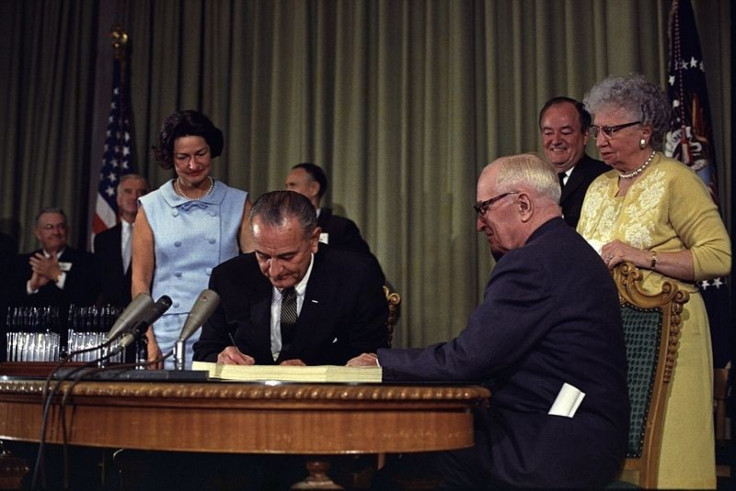The Great Society Lives - Supreme Court Health Care Ruling A Victory For All Americans
Column

With the U.S. Supreme Court's decision to uphold the Affordable Care Act, also known as national health care reform or Obamacare, the United States, the richest nation on earth, now joins other, advanced, Western democracies in having a universal health insurance plan.
And to think it only took the United States 100 years to enact a health care system for all of its citizens!
President Theodore Roosevelt, a key figure in the Progressive movement, first proposed the idea of a national health insurance program in 1912.
Or, as progressives like to say, There's a reason Teddy Roosevelt's face is on Mount Rushmore.
Promote The General Welfare
Further, without question, the health care reform act represents not only a health care system advance for the United States -- it represents a civilizational and a theoretical advance, as well. It is the United States' most important social policy change since the establishment of Medicare, the health insurance program for senior citizens, in 1965.
The ACA's most important features are: 1) the requirement that all citizens carry health insurance via private insurers, their companies, state-sponsored exchanges, Medicare or Medicaid; 2) subsidies for lower-income adults to help them purchase health insurance, and 3) a tax on upper-income adults to help those less fortunate pay for health care services.
Moreover, the benefits of the above three points should not be lost on anyone:
* Requiring all citizens to purchase insurance will spread insurance risk over a wider pool, lowering per-person insurance costs. It will also eliminate free rider individuals who seek to game the system by not purchasing insurance until they need it -- a destructive, irresponsible tactic that increases systemic risk and drives up per-person insurance premiums.
* Subsidies will help provide a decent health insurance plan for adults of low and modest incomes: that is the only humane stance a society can take, end of discussion. What's more, that the United States -- the richest nation on earth -- went decades in the modern era without a national health insurance plan after dozens of less-affluent nations passed plans is a reprehensible offense. The ACA ends this national disgrace and sets the nation on a humane path regarding health care for its citizens.
* The tax on upper-income adults begins to address the maldistribution in income and wealth worsened by supply-side economic policies of the last 30 years. It also asks these affluent Americans to pay their fair share of the cost of socially just public policies. The health care tax is not the only extra tax that should be levied on these adults, but it is a start -- a first step toward building a more-compassionate, more-just society in the postmodern era.
Obamacare: Two Provisions That Would Make FDR, Harry Truman and LBJ Proud
Further, the ACA has two civilization-altering tenets that would make Presidents Franklin D. Roosevelt, Harry S. Truman and Lyndon B. Johnson proud.
Medicaid: The ACA expands Medicaid eligibility to include individuals and families with incomes up to 133 percent of the U.S. poverty level.
Subsidies / Health Insurance Exchanges: Low-income individuals and families with incomes up to 400 percent of the U.S. poverty level will receive federal subsidies on a sliding scale, if they choose to purchase health insurance via an exchange. Health insurance exchanges will commence operations in each state, offering a marketplace at which individuals and small businesses can compare policies and insurance premiums (with a government subsidy, if eligible).
Underscoring -- if the Affordable Care Act contained only those two tenets alone -- that would be enough to justify the policy change -- they are that important in low/moderate-income Americans' lives, and they will improve health outcomes that much.
But of course, the Affordable Care Act does much more:
Individuals with annual incomes from work in excess of $200,000 ($250,000 for a married couple filing jointly) will be subject to an 0.9 percent tax, effective Jan. 1, 2013.
Also, an additional Medicare tax of 3.8 percent will apply to unearned income -- specifically, the lesser of net investment income or the amount by which adjusted gross income exceeds $200,0000 ($250,000 for a married couple filing jointly), effective Jan. 1, 2013.
Also, companies employing 50 or more people but not offering health insurance will also pay a shared responsibility requirement tax, if the government has had to subsidize an employee's health care insurance.
Pre-existing condition ban: In addition, insurance companies are banned from denying coverage to applicants with pre-existing health conditions.
Children/parents: Also, children are allowed to stay on their parents' insurance plans until 26 years of age.
Preventive care: Insurance companies required to include preventative health care at no extra cost, and banned from setting limits on payouts for coverage.
The Great Society
Opponents of the ACA will try to portray it as everything under the sun -- from creeping socialism to government coming between you and your doctor to a too costly plan. Don't believe a word. These critics do not have a better plan -- they have no interest in providing health care to the poor and the uninsured -- and they do not represent the interests of the nation. Too often, they represent only the interests of a moneyed coterie that seeks to maintain inhumane, repressive, and primitive policies. Ignore them.
Roughly 80 years after President Franklin D. Roosevelt launched the New Deal social policies, almost 50 years after President Lyndon B. Johnson signed Medicare, the health insurance program for senior citizens, and about 40 years after U.S. Sen. Edward M. Kennedy rejected a national health insurance idea proposed by President Richard M. Nixon, the United States, as a result of the Supreme Court's June 28 decision, finally has a universal health insurance program.
The nation is beginning to recover.
© Copyright IBTimes 2024. All rights reserved.











